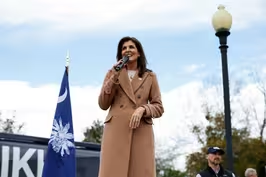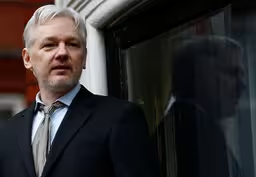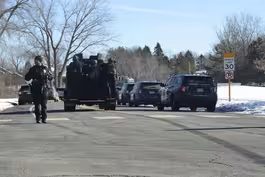
Taiwan's top diplomat in the U.S. on tensions with China
Clip: 2/20/2024 | 8m 19sVideo has Closed Captions
Taiwan’s top diplomat in Washington discusses U.S. relations and tensions with China
Tensions in the Taiwan Strait increased this week following incidents near an island involving the Chinese and Taiwanese coast guards. It's happening at a sensitive moment, in between Taiwan's recent election and the upcoming inauguration of its new president. Nick Schifrin speaks to Taiwan’s new representative to the U.S., Alexander Tah-ray Yui, for his first broadcast interview.
Problems playing video? | Closed Captioning Feedback
Problems playing video? | Closed Captioning Feedback
Major corporate funding for the PBS News Hour is provided by BDO, BNSF, Consumer Cellular, American Cruise Lines, and Raymond James. Funding for the PBS NewsHour Weekend is provided by...

Taiwan's top diplomat in the U.S. on tensions with China
Clip: 2/20/2024 | 8m 19sVideo has Closed Captions
Tensions in the Taiwan Strait increased this week following incidents near an island involving the Chinese and Taiwanese coast guards. It's happening at a sensitive moment, in between Taiwan's recent election and the upcoming inauguration of its new president. Nick Schifrin speaks to Taiwan’s new representative to the U.S., Alexander Tah-ray Yui, for his first broadcast interview.
Problems playing video? | Closed Captioning Feedback
How to Watch PBS News Hour
PBS News Hour is available to stream on pbs.org and the free PBS App, available on iPhone, Apple TV, Android TV, Android smartphones, Amazon Fire TV, Amazon Fire Tablet, Roku, Samsung Smart TV, and Vizio.
Providing Support for PBS.org
Learn Moreabout PBS online sponsorshipWILLIAM BRANGHAM: This week, tensions have increased in the Taiwan Strait following incidents near an island involving the Chinese and Taiwanese Coast Guards.
It's happening at a sensitive moment in between Taiwan's recent election and the upcoming inauguration of its new president.
Nick Schifrin speaks to Taiwan's new representative in Washington for his first broadcast interview.
NICK SCHIFRIN: More than any single issue, Taiwan has long been at the center of tension between the United States and Beijing.
Last month, Taiwan elected Lai Ching-te, known as William Lai, as president.
It is an unprecedented third straight presidential victory for the Democratic Progressive Party, or DPP.
Beijing calls Lai a separatist whose election could trigger war.
But, publicly, Lai has insisted his policy is to retain the status quo.
To discuss these issues and the wider relations among Taiwan, China and the U.S., we welcome Alexander Tah-ray Yui, Taiwan's top diplomat to the United States.
Thank you very much, Representative.
Let's begin with some recent tension in the strait.
Last week, two Chinese nationals died when their boat capsized while it was being chased about one mile from the Taiwanese island of Kinmen.
Today, Taiwan drove away a Chinese Coast Guard boat after yesterday the Chinese Coast Guard actually boarded a Taiwanese tourist boat.
What is your concern that these incidents could escalate?
ALEXANDER TAH-RAY YUI, Taiwanese Representative to the United States: Well, we have always strived for status quo in the Taiwan Strait.
The incident that you just mentioned, it's a concerning trend that is happening.
They are the ones who are changing the status quo by changing all these incidents.
They talk about red lines.
They say, oh, you shouldn't cross the red line because this is a fundamental issue for the people of the Republic of China.
But they are the ones changing the red lines.
They draw the red lines constantly on a different line.
And that is a concerning trend, including the one in Kinmen.
NICK SCHIFRIN: There's also diplomatic pressure.
After the election, the Pacific island of Nauru traded recognition of Taipei for Beijing... ALEXANDER TAH-RAY YUI: Yes.
Sure.
NICK SCHIFRIN: ... leaving you with only 12 diplomatic allies.
That's 10 countries that have switched from Taipei to Beijing during the term of President Tsai.
Why do you believe Taiwan is losing so much recognition?
ALEXANDER TAH-RAY YUI: Well, in Nauru's case, it was mainland China's punishment to the Taiwanese people for choosing the candidate they did not like.
But we will not go challenges or go race with mainland China on a dollar diplomacy.
People in Republic of China promises these countries a lot of benefits, a windfall of economic benefits, airports, railways, housing, et cetera.
But in most of the cases, they go unanswered after they switch sides.
NICK SCHIFRIN: Beijing has recently unilaterally adjusted a commercial flight path.
ALEXANDER TAH-RAY YUI: Exactly right.
(CROSSTALK) NICK SCHIFRIN: We're going to show an app right here.
ALEXANDER TAH-RAY YUI: Yes.
NICK SCHIFRIN: Closer to the median line in the Taiwan Strait, essentially normalizing the flight of Chinese civilian aircraft closer to Taiwan.
Why is that so concerning to Taipei?
ALEXANDER TAH-RAY YUI: Well, first of all, their measure was unilateral.
And they should have consulted with Taiwan, the way they consulted with Taiwan back in 2015 when M503 was established.
It increased dangers of national security for us, because their planes are flying closer to Taiwan.
But it also increases dangers for civilian people, civilian air routes, because there is encroaching on our airspace.
And they should have consulted with us first.
NICK SCHIFRIN: I have a question about whether Taiwan trusts the United States.
We looked at a poll that shows, over the last few years, Taiwanese trust in the United States has dropped from 45 percent to 34 percent.
And, of course, we're all watching where Congress has not been able to send aid, mostly to Ukraine, but also to Taiwan and Israel, that the administration has promised.
The leading Republican candidate in the election, of course, is promising or is vowing that he will not stand by promises to NATO.
Do you trust that in the future the U.S. will stand by whatever promises it makes to Taiwan?
ALEXANDER TAH-RAY YUI: Well, the recent definition, whenever people talk about Taiwan-U.S. relations, the most often used term is rock-solid.
And I would say that the support that we, the Republic of China Taiwan, we get from United States is bipartisan.
And it's very heartwarming that Congress has the last session passed over 60 resolutions or acts in favor of Taiwan.
The United States, who has -- is having elections in November.
And we are trustful that, whoever wins the election, the new administration, this bipartisan support for Taiwan will continue to be.
So, we trust that we will continue working closely with the U.S. administration, as well as Congress, so that Taiwan can get under circumstances the best defense capabilities as possible.
NICK SCHIFRIN: If Ukraine loses to Russia or forced to cede territory in some kind of negotiated settlement with Russia, would that embolden Xi Jinping to attack Taiwan?
ALEXANDER TAH-RAY YUI: Well, that's why the defense of Ukraine against the Russian invasion is very important, and the support from all like-minded countries to make sure that Ukraine is able to defend itself is very important, because facing aggression from authoritarian regimes -- and you speak about appeasement.
You speak about the Crimea incident in 2014.
Not much was done.
So it emboldened the Russians to attack Ukraine two years ago.
But you see also, you see the Chinese foreign minister, Wang Yi, was in Munich not long ago.
NICK SCHIFRIN: The security forum this weekend.
ALEXANDER TAH-RAY YUI: Yes, the security -- and he mentioned about, if you want peace and stability in the Taiwan Straits, then you should not cross our red lines, and then you should follow our one-China principle and accept that Taiwan is part of us.
And excuse me, this sounds very much like Munich in 1938, when Hitler said, you want peace and stability in my region, then cut -- Sudetenland is mine.
Isn't it the same thing that they're saying?
But, besides, I'm -- as I said... (CROSSTALK) NICK SCHIFRIN: Do you think the U.S. is acting in the correct way to prevent war?
ALEXANDER TAH-RAY YUI: Well, we're very heartened and we are very appreciative that, every time the U.S. leaders, as well as other leaders from the United States, from Japan, et cetera, they meet with the Chinese leadership, they -- they warn, they appeal to the Chinese side.
They're insistent that peace and stability of the China -- of the Taiwan Strait is necessary, and they're against the unilateral -- unilateral change of status called by means of military aggression, nor economic coercion.
NICK SCHIFRIN: But they also assure Beijing that they will not support Taiwan independence and they will restrain Taiwan from any further action.
ALEXANDER TAH-RAY YUI: People in Taiwan are not talking about independence nowadays.
You go to Taiwan, nobody is talking about independence.
Again, Taiwan is our official name is Republic of China.
We are already a sovereign and independent nation.
So, there is no talk about independence, because we already are.
And, again, as I mentioned in another occasion, if we talk about independence, it means that we are right now subordinate to some other entity, which we're not.
In President Tsai's 2021 National Day speech, she mentioned there's four insistences.
We will insist on rejecting any attempt to encroach or annex Taiwan and the Republic of China and the insistence that the future of ROC Taiwan will be determined by the people of Taiwan.
And that's the line that we follow and that's the road that President Lai is also following.
NICK SCHIFRIN: Representative Alexander Yui, thank you very much.
ALEXANDER TAH-RAY YUI: It's a pleasure sir.
Exhibit chronicles rich history of independent Black cinema
Video has Closed Captions
Clip: 2/20/2024 | 6m 43s | Exhibit chronicles rich history of independent Black cinema (6m 43s)
Haley vows to stay in 2024 race as Biden prepares for Trump
Video has Closed Captions
Clip: 2/20/2024 | 5m 35s | Haley vows to stay in 2024 presidential race as Biden prepares for Trump (5m 35s)
Julian Assange tries to avoid extradition to the U.S.
Video has Closed Captions
Clip: 2/20/2024 | 12m 28s | Wikileaks founder Julian Assange makes last-ditch attempt to avoid U.S. extradition (12m 28s)
Low demand for commercial office space fuels economic fears
Video has Closed Captions
Clip: 2/20/2024 | 8m 10s | Low demand for commercial office space fuels economic fears (8m 10s)
A Minnesota shooting and the U.S. domestic violence problem
Video has Closed Captions
Clip: 2/20/2024 | 6m 25s | Deadly Minnesota shooting sheds light on nation's growing domestic violence problem (6m 25s)
News Wrap: Biden to impose new sanctions after Navalny death
Video has Closed Captions
Clip: 2/20/2024 | 4m 59s | News Wrap: Biden to impose major sanctions on Russia in response to Navalny's death (4m 59s)
Providing Support for PBS.org
Learn Moreabout PBS online sponsorship
- News and Public Affairs

FRONTLINE is investigative journalism that questions, explains and changes our world.

- News and Public Affairs

Amanpour and Company features conversations with leaders and decision makers.












Support for PBS provided by:
Major corporate funding for the PBS News Hour is provided by BDO, BNSF, Consumer Cellular, American Cruise Lines, and Raymond James. Funding for the PBS NewsHour Weekend is provided by...





